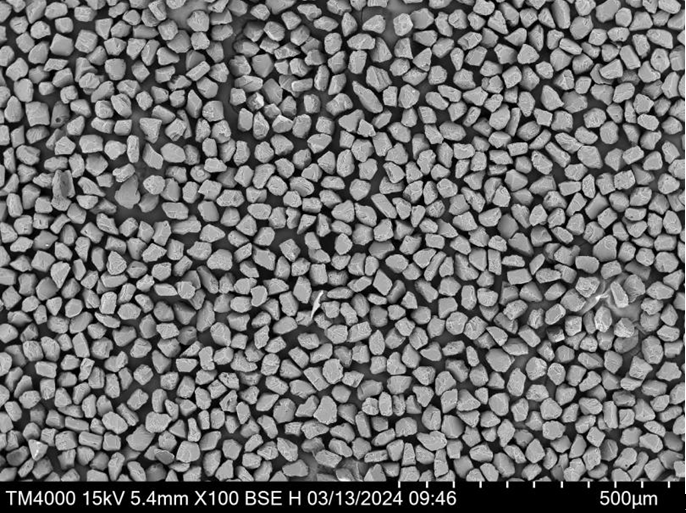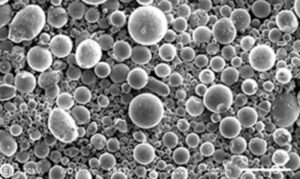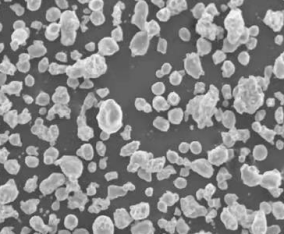1. المقدمة: دور مسحوق الحديد في الضغط والتلبيد
مسحوق الحديد مادة أساسية في صناعة تعدين المساحيق (PM)، ويستخدم على نطاق واسع في عمليات الضغط والتلبيد لإنشاء مكونات دقيقة ذات خصائص ميكانيكية ممتازة. تستخدم هذه المكونات في تطبيقات السيارات والفضاء والآلات الصناعية والإلكترونيات الاستهلاكية.
في تعدين المساحيق، يتضمن الضغط ضغط مسحوق الحديد في قالب لتشكيل الشكل المطلوب. ثم يقوم التلبيد بتسخين الجزء المضغوط أسفل نقطة الانصهار الخاصة به، مما يؤدي إلى ربط الجسيمات معًا وتعزيز القوة.
مسحوق الحديد في تصنيع B2B
المزايا الرئيسية لاستخدام مسحوق الحديد في تصنيع مكونات B2B:
- الفعالية من حيث التكلفة: يقلل من هدر المواد.
- مرونة التصميم: يسمح بأشكال هندسية معقدة.
- كفاءة إنتاج عالية: مثالي للإنتاج الضخم.
- خواص ميكانيكية محسّنة: يتم تحقيقه من خلال السبائك والتلبيد.
درجات مسحوق الحديد الشائعة
| الصف | التركيب | الكثافة (جم/سم مكعب) | التطبيقات |
|---|---|---|---|
| F-0000 | حديد نقي | 6.6 | أجزاء مغناطيسية، جلبات |
| FC-0208 | حديد نحاس | 7.0 | الأجزاء الهيكلية |
| FD-0205 | سبائك الانتشار | 6.9 | تروس، ضرس |
| FL-4605 | سبائك فولاذية منخفضة | 7.2 | أجزاء عالية القوة |
| FN-0205 | حديد-نيكل | 7.1 | الأجزاء المقاومة للتآكل |
2. التطبيقات الصناعية لمسحوق الحديد المضغوط والمُلبد
تُستخدم مساحيق الحديد المضغوطة والمُلبدة في مجموعة واسعة من الصناعات لتصنيع الأجزاء التي تتطلب القوة والدقة ومقاومة التآكل.
صناعة السيارات
- مكونات المحرك: بكرات عمود الكامات، أذرع الروك
- أجزاء ناقل الحركة: محاور متزامنة، تروس
- تطبيقات الهيكل: حلقات ABS، علب المستشعرات
الصناعة الكهربائية
- مكونات مغناطيسية ناعمة: المحولات، المحاثات
- المهلة الزمنية: 7-15 يومًا حسب الكميةيتم ترتيب التعبئة الآمنة والخدمات اللوجستية الدولية
الإلكترونيات الاستهلاكية
- تتوفر خيارات تسليم المصنع، والتسليم بسعر التكلفة والتأمين والشحن، والتسليم على ظهر السفينةدعم فني وخدمة عملاء مستمران
- المشتتات الحراريةللمساعدة في التلبيد، واستكشاف الأخطاء وإصلاحها، وما إلى ذلك.
📦 خيارات التعبئة للمشترين من الشركات:
- محامل وجلب
- تعبئة مخصصة بكميات كبيرة للمصنعين الأصليين
- 🌍 قدرات الشحن والتصدير
الشحن في جميع أنحاء العالم عبر البحر والجو والشحن السريع
- شركاء الخدمات اللوجستية: DHL و FedEx و Maerskوثائق جاهزة للتصدير: MSDS، COA، RoHS، REACH إذا لزم الأمر
- 📩 هل أنتم مستعدون لتقديم طلب أو طلب عينة؟ أرسلوا طلبكم من خلالوسيعاود فريقنا الاتصال في غضون 24 ساعة.
- الاتساقمسحوق SBK2218: الدليل النهائي للمشترين من الشركات في مجال تعدين المساحيق 6
10. الأسئلة الشائعة: كل ما يحتاج المشترون إلى معرفته حول مسحوق SBK2218
فيما يلي الأسئلة الشائعة التي يطرحها المشترون من الشركات الذين يفكرون في استخدام مسحوق SBK2218 لتلبية احتياجاتهم التصنيعية أو التوزيعية.
❓ ما هو أفضل استخدام لمسحوق SBK2218؟
- يعتبر SBK2218 مثاليًا للأجزاء الهيكلية التي تتطلب قوة عالية ومقاومة للتآكل، مثل:تروس ومحاور السيارات
- التطبيقاتمكونات نقل الحركة
أجزاء الآلات الصناعية
- أمثلة❓ ما الفرق بين SBK2218 و FD-0208؟
- مزاياSBK2218
- سبيكة منتشرة مع Cu و Ni و Moسبيكة منتشرة مع Cu و Ni
قوة ميكانيكية أعلى
- أمثلة: FX-2008، FX-1005
- المزاياقوة معتدلة
- أجزاء ذات حمل عالٍ وحاسمة للأداءمكونات هيكلية عامة
❓ ما هي الحد الأدنى لكميات الطلب؟
- أمثلةالحد الأدنى لكمية الطلب لـ SBK2218 القياسي: 100 كجم
- مزاياالحد الأدنى لكمية الطلب للخلطات أو العبوات المخصصة: 500 كجم
- التطبيقاتتتوفر كميات العينات (1-2 كجم) للاختبار
❓ هل يمكن لشركة Truer تخصيص درجات المسحوق بناءً على طلبنا؟
- نعم! تقدم شركة Shanghai Truer خدمات تصميم مساحيق OEM. يمكنكم طلب:تركيبة كيميائية معدلة
- توزيع حجم الجسيمات المعدلمواد تشحيم أو إضافات مخصصة ممزوجة
| نوع المسحوق | الميزة الرئيسية | طريقة الإنتاج | ❓ ما هي الشهادات التي يستوفيها مسحوق SBK2218 الخاص بكم؟ |
|---|---|---|---|
| ISO 9001: إدارة الجودة | الامتثال لـ RoHS/REACH عند الطلب | التذرية | الأجزاء الهيكلية |
| يتم توفير تقارير اختبار الدُفعات وCOA الداخلية | ❓ كيف يمكنني ضمان الاتساق بين الدُفعات؟ | التذرية | تجري Truer اختبارات بين الدُفعات بما في ذلك: |
| التخفيض | اختبار معدل التدفق | الاختزال الكيميائي | مكونات مغناطيسية ناعمة |
التركيب الكيميائي عن طريق قياس الطيف قياسات الكثافة الخضراء والمُلبدة 💼 تعرفوا على المزيد حول مراقبة الجودة وقدرات البحث والتطوير لدينا على موقعنا

نعم. نقوم بشحن مسحوق SBK2218 على مستوى العالم وندعم:
تصنيع المصنعين الأصليين/تصميم المعدات الأصلية
وثائق مخصصة
- دعم مبيعات وفني متعدد اللغاتالخلاصة النهائية: لماذا يعتبر مسحوق SBK2218 من Truer هو الخيار الأفضل لكم من الشركات
- شركة Shanghai Truer Technology هي أكثر من مجرد مورد - نحن شريككم الاستراتيجي في مجال تعدين المساحيق. بفضل خبرة تزيد عن عقد من الزمان وقدرات التصنيع المتطورة، نقدم مسحوق SBK2218 الذي يلبي المتطلبات الصارمة للصناعات عالية الأداء اليوم.🌟 ملخص المزايا الرئيسية:
- ✅ مسحوق SBK2218 عالي الأداء بجودة متسقة✅ إنتاج مرن للدرجات القياسية والمخصصة
✅ أسعار تنافسية مع التسليم العالمي
- ✅ دعم فني كامل لتطبيقات الشركات
✅ موثوق به من قبل المصنعين الأصليين والموزعين والمصنعين من المستوى الأول في جميع أنحاء العالم - 📈 اتخذوا الخطوة التالية
سواء كنتم تقومون بتوسيع خط منتجاتكم، أو تحسين عملية التصنيع الخاصة بكم، أو دخول سوق جديد، يمكن لمسحوق SBK2218 من Truer أن يمنحكم الميزة التنافسية. بدعم من الخبرة الفنية العميقة وأنظمة مراقبة الجودة القوية، نحن هنا لمساعدة أعمالكم على النجاح. - 🔗 تفضلوا بزيارة
لتنزيل أوراق البيانات الفنية، وتصفح المنتجات ذات الصلة، وبدء رحلة التوريد الخاصة بكم. - 🔗 ملخص الروابط الداخلية المضمنة (5 إجمالاً):
ملف تعريف شركة Shanghai Truer
قسم المدونة والأخبار
| المنطقة | إذا كنتم مشترين من الشركات تبحثون عن مسحوق SBK2218 موثوق به وعالي الأداء، فإن شركة Shanghai Truer Technology مستعدة لتلبية احتياجاتكم بدقة واحترافية ودعم عالمي المستوى. | مسحوق SBK2218: الدليل النهائي للمشترين من الشركات في مجال تعدين المساحيق 1 | المحركات الرئيسية |
|---|---|---|---|
| آسيا والمحيط الهادئ | 44% | 50% | مسحوق SBK2218: الدليل النهائي للمشترين من الشركات في مجال تعدين المساحيق 2 |
| أمريكا الشمالية | 28% | 26% | الطيران والفضاء والدفاع |
| أوروبا | 20% | 18% | مسحوق SBK2218 |
| بقية العالم | 8% | 6% | مسحوق الحديد للكبس والتلبيد: دليل كامل للمشترين من الشركات | مادة التصنيع بالإضافة |
مسحوق الحديد هو مادة أساسية في صناعة تعدين المساحيق، ويستخدم على نطاق واسع في عمليات الكبس والتلبيد لإنشاء مكونات دقيقة
1. مقدمة: دور مسحوق الحديد في الكبس والتلبيد
مسحوق الحديد هو مادة أساسية في صناعة تعدين المساحيق، ويستخدم على نطاق واسع في عمليات الكبس والتلبيد لإنشاء مكونات دقيقة ذات خصائص ميكانيكية ممتازة. تستخدم هذه المكونات في تطبيقات السيارات والفضاء والآلات الصناعية والإلكترونيات الاستهلاكية.
- توزيع متسق لحجم الجسيمات
- مستويات نقاء عالية النقاء
- في تعدين المساحيق، يتضمن الكبس ضغط مسحوق الحديد في قالب لتشكيل الشكل المطلوب. ثم يؤدي التلبيد إلى تسخين الجزء المضغوط أسفل نقطة انصهاره، مما يؤدي إلى ربط الجسيمات معًا وتعزيز القوة.
- مسحوق الحديد في تصنيع الشركات
المزايا الرئيسية لاستخدام مسحوق الحديد في تصنيع مكونات الشركات:
- : يقلل من هدر المواد.
- : يسمح بأشكال هندسية معقدة.
- كفاءة إنتاج عالية
: مثالي للإنتاج الضخم.
- : يتم تحقيقه من خلال السبائك والتلبيد.
- درجات مسحوق الحديد الشائعة
- حديد نقي
أجزاء مغناطيسية، بطانات
- FD-0205
- تروس، ضرس
- حديد-
2. التطبيقات الصناعية لمسحوق الحديد المضغوط والمُلبد
- تُستخدم مساحيق الحديد المضغوطة والمُلبدة في مجموعة واسعة من الصناعات لتصنيع الأجزاء التي تتطلب قوة ودقة ومقاومة للتآكل.
- مكونات المحرك
- : بكرات عمود الكامات، أذرع الروك
أجزاء ناقل الحركة
: محاور التزامن، التروس
تطبيقات الهيكل
| شركة | البلد | : حلقات ABS، علب المستشعرات | موقع إلكتروني |
|---|---|---|---|
| شركة شنغهاي تروير تكنولوجي المحدودة (Shanghai Truer Technology Co., Ltd.) | الصين | الصناعة الكهربائية | am-material.com |
| هوغاناس إيه بي | : المحولات والمحاثات | نوى المرحلات | hoganas.com |
| شركة JFE للصلب | اليابان | : مفاتيح ومرحلات السيارات | الدروع المغناطيسية |
| Pometon S.p.A | الهند/إيطاليا | : في الهواتف الذكية وأجهزة الكمبيوتر المحمولة | : للإلكترونيات المدمجة |
| مسحوق CNPC | الصين | الآلات والأدوات | حشوات أدوات القطع |
لماذا تبرز شنغهاي ترور
مكونات النظام الهيدروليكي
- فوائد الحديد المُلبد في الاستخدام الصناعي
دقة الأبعاد - : مثالي للتجميع الآلي.
تشطيب سطحي فائق - : يقلل من الحاجة إلى التشغيل الآلي.
: تكرار ممتاز في الإنتاج الضخم. - 3. أنواع مسحوق الحديد المستخدم في تعدين المساحيق
يتم اختيار أنواع مختلفة من مساحيق الحديد بناءً على التطبيق والخصائص الميكانيكية المطلوبة وعملية التصنيع. - 1. مسحوق الحديد النقي
يتم إنتاجه عن طريق
قم بزيارة : الانحلال المائي أو الاختزال : أجزاء مغناطيسية، مواد احتكاك

: FL-4605، FD-0208
: توزيع سبائك موحد
حالة الاستخدام
- : مكونات هيكلية عالية القوة
3. مسحوق الحديد المخلوط بالانتشار - : صلابة وقابلية ضغط متوازنة
يستخدم في - : تروس السيارات، التروس المسننة
4. مسحوق الفولاذ المختلط منخفض السبائك - : سلسلة PM 4200
: يجمع بين قابلية الضغط والقوة
: مكونات تحمل الأحمال
5. مسحوق الحديد المتخلل
- متخلل مع
- : النحاس أو الفولاذ
- يحسن : الكثافة، قوة الشد
- الاستخدام النموذجي منحل بالماء
فعالة من حيث التكلفة، وقابلية ضغط جيدة منحل بالغاز نقاء أعلى، جزيئات كروية
أجزاء مغناطيسية أو دقيقة
حديد عالي النقاء
عملية الطلب بالجملة خطوة بخطوة
تقدم شركة Shanghai Truer Technology Co., Ltd مجموعة شاملة من
مساحيق الحديد PM
- مثل F-0000 و FC-0208 و FD-0208 والفولاذ المختلط منخفض السبائك مثل FL-4605. تتوفر هذه المساحيق في كل من الأشكال المنحلة بالماء والمختزلة لتلبية الاحتياجات المتنوعة للمشترين من الشركات في صناعات تعدين المساحيق.
- مسحوق الحديد للكبس والتلبيد: دليل كامل للمشترين من الشركات 4
- 4. اتجاهات السوق العالمية وتوق
- نطاق حجم الجسيمات
- الكمية (الحد الأدنى لكمية الطلب إلى أحجام كبيرة)
- تنسيق التعبئة (أكياس 25 كجم، أكياس كبيرة 1 طن، إلخ.)
- التطبيق المقصود (الأجزاء المُلبدة، المكونات المغناطيسية، إلخ.)
الخطوة 2: طلب عرض أسعار
- قم بزيارة صفحة اتصل بنا
- أرسل استفسارك بما في ذلك:
- اسم الشركة وعنوانها
- تفاصيل التطبيق
- متطلبات الاعتماد أو الامتثال (ISO، RoHS، REACH، إلخ.)
الخطوة 3: تلقي استشارة فنية
- سيقوم الفريق الفني لـ Truer بما يلي:
- التوصية بأفضل درجة مسحوق
- توفير مستندات TDS و SDS و COA
- اقتراح إضافات أو مواد تشحيم إذا لزم الأمر (مثل SUW-5000B، QH-150)
الخطوة 4: تأكيد الطلب والدفع
- تأكيد التسعير بناءً على الحجم والوجهة والتخصيص
- طرق الدفع المقبولة: T/T أو L/C أو شروط أخرى عند الاتفاق
الخطوة 5: الإنتاج والشحن
- مهلة التنفيذ: 7-21 يومًا حسب الكمية والتخصيص
- الشحن الدولي مع دعم كامل لوثائق التصدير
- اختياري: فحص ما قبل الشحن واختبار طرف ثالث
الخدمات ذات القيمة المضافة
- المزج المخصص: اجمع الحديد مع النحاس أو النيكل أو الفوسفور
- التشحيم المسبق: مواد تشحيم مثل Lube-W أو SUW-8000 مضافة إلى المسحوق
- الغربلة والتحكم في الجسيمات: مصممة خصيصًا لمواصفات التلبيد الخاصة بك
- حزم الإضافات: للتطبيقات المغناطيسية اللينة أو عالية القوة
لمزيد من التفاصيل الفنية حول الدرجات والخيارات المتاحة للمعالجة، قم بزيارة صفحة منتج مسحوق الحديد.

9. الأسئلة الشائعة: المصادر والتسعير والمواصفات الفنية
فيما يلي بعض الأسئلة المتداولة من مشتري B2B ومديري المشتريات الذين يتطلعون إلى الحصول على مسحوق الحديد لتطبيقات الضغط والتلبيد.
س1: ما هو الحد الأدنى لكمية الطلب (MOQ) لمسحوق الحديد بالجملة؟
A: عادةً ما يكون الحد الأدنى لكمية الطلب 500 كجم، ولكن تتوفر كميات تجريبية أصغر عند الطلب، خاصة للعملاء الجدد أو أغراض البحث والتطوير.
س2: ما هي الشهادات التي يتوافق معها مسحوق الحديد Truer؟
A: تتوافق جميع مساحيق الحديد مع معايير الجودة ISO 9001، مع سجلات دفعات قابلة للتتبع. يمكن لـ Truer أيضًا توفير مساحيق متوافقة مع RoHS و REACH و TS16949 لتطبيقات السيارات.
س3: هل يمكنني طلب تركيبات سبائك مخصصة؟
A: نعم. تقدم Truer خدمات المزج والتطوير المخصصة للسبائك لتلبية متطلبات ميكانيكية أو مغناطيسية معينة.
س4: ما هي المهلة الزمنية النموذجية للطلبات؟
A: تتراوح المهلة الزمنية القياسية من 7 إلى 21 يوم عمل حسب درجة المنتج والكمية واحتياجات التعبئة والتغليف.
س5: كيف أتأكد من أن المسحوق يفي بمعايير التلبيد الخاصة بي؟
A: يوفر Truer:
- صحائف البيانات الفنية (TDS)
- منحنيات وتوصيات التلبيد
- استشارة فنية في الموقع أو افتراضية
س6: ما هي الصناعات التي تستخدم مسحوق الحديد الخاص بك بشكل شائع؟
A: تشمل الصناعات:
- السيارات: التروس، المزامنات، حلقات ABS
- المعدات الصناعية: البطانات، المحامل
- الإلكترونيات الاستهلاكية: النوى المغناطيسية
- التصنيع المضاف: النماذج الأولية المعدنية المطبوعة ثلاثية الأبعاد
س7: هل يمكن لـ Truer توفير الإضافات ومواد التشحيم مع مسحوق الحديد؟
A: نعم، تقدم Truer مجموعة كاملة من الإضافات مثل:
- مواد التشحيم: SUW-5000B، SUW-8000، Lube-W
- عوامل القطع: SME-100، TD-8
- الإضافات المغناطيسية: QH-150
- الجرافيت: TBC-400، TBC-1000
يمكن خلطها مسبقًا أو شحنها بشكل منفصل، اعتمادًا على طلبك.
مكافأة: لماذا Truer هو شريك PM المناسب
Shanghai Truer Technology Co., Ltd ليست مجرد مورد - إنها شريك استراتيجي لـ B
- خبرة في علم الفلزات تزيد عن 14 عامًا
- مرافق إنتاج حديثة
- حلول مخصصة للمواد في التصنيع بالمسحوق والتصنيع بالإضافة
- شحن عالمي ودعم فني
بفضل سمعتها القوية في الصين والتقدير المتزايد في جميع أنحاء العالم، تُعد Truer المورد المفضل للشركات التي تبحث عن مساحيق حديد موثوقة وعالية الجودة للضغط والتلبيد.
لاستكشاف مجموعة منتجاتها الكاملة، قم بزيارة الصفحة الرئيسية لـ Truer.
ملخص الروابط الداخلية
فيما يلي الروابط الداخلية المضمنة كنص مرساة في هذه المدونة:
- قياسات الكثافة الخضراء والمُلبدة
- : الانحلال المائي أو الاختزال
- صفحة اتصل بنا
- صفحة منتج مسحوق الحديد
- الصفحة الرئيسية لـ Truer
باتباع هذا الدليل، يمكن لمشتري B2B الحصول بثقة على مسحوق الحديد للضغط والتلبيد من شركة مصنعة موثوقة مثل Shanghai Truer Technology Co., Ltd - مما يضمن الجودة والاتساق والأداء عبر كل دفعة إنتاج.

